How did four ’80s kids emerge from a town of ‘lintheads’ to become Charlotte tastemakers?
Andy Cauble climbs out of a vehicle wrapped with graphics advertising Pinky’s Westside Grill and marvels as he walks up the driveway toward his old high school friend Trey Wilson’s hundred-year-old house, which sits along a suburban-Charlotte street that is iconic in its own right.
“I’ve always loved Union Street, growing up in Concord,” Cauble says, “and I never knew anybody that had a house on Union Street.”
Inside — once seated around a table with Cauble, Wilson and another guy whose last name is Wilson (Brian, no relation) — Dolphus “Dolph” Ramseur makes a similarly gaping remark.
“This is the second time I’ve ever been in one of these Union Street homes,” Ramseur says. When he was growing up, this little slice of Cabarrus County was — “I don’t know how you would phrase it at the time. But we were (further) out in the county, so this was sort of ‘bright-lights, big-city’ essentially. So Trey, you’ve moved on up.”
“Bigger homes are down that way,” Trey Wilson deadpans, and the four men share a laugh. The reality, though, is that they’ve all moved up since graduating from Northwest Cabarrus High School in the late ’80s.
Cauble (class of 1989) isn’t just an employee of Pinky’s; he’s one of two owners of both the Charlotte and Huntersville locations.
Ramseur (class of 1987) owns an independent record label; manages a small stable of musicians that includes a very big folk-rock band — The Avett Brothers, also of Concord; and is a 2016 inductee into the North Carolina Music Hall of Fame.
In addition to co-founding Charlotte country-rockabilly band The Loose Lugnuts, Brian Wilson (class of 1987) has partnered with his brother Mark Wilson on business ventures that include honky-tonk dive bar the Thirsty Beaver Saloon in Plaza Midwood, secondhand clothing store The Rat’s Nest in NoDa in 2004, and Tex-Mex restaurant The Tipsy Burro Saloon & Cantina on Monroe Road.
And Trey Wilson (class of 1988) is co-owner of two buzzy Charlotte restaurants — Pizza Baby in Wesley Heights and Flour Shop in Montford — and co-founded Customshop in Elizabeth.
The guys have gathered together on this February morning in their hometown for a ragtag reunion of sorts. (Cauble and Brian Wilson didn’t know each other at Northwest Cabarrus, but otherwise each of the guys spent time in high school hanging out, sometimes a little, sometimes quite a lot.) Organized at Ramseur’s suggestion, the loose goal of the conversation was this:
Was there something about their Cabarrus County rearing that put each of them on a path to creating local institutions with such distinctive character, or was it just a coincidence?
Here are the highlights from the chat, edited to improve clarity, brevity and flow.
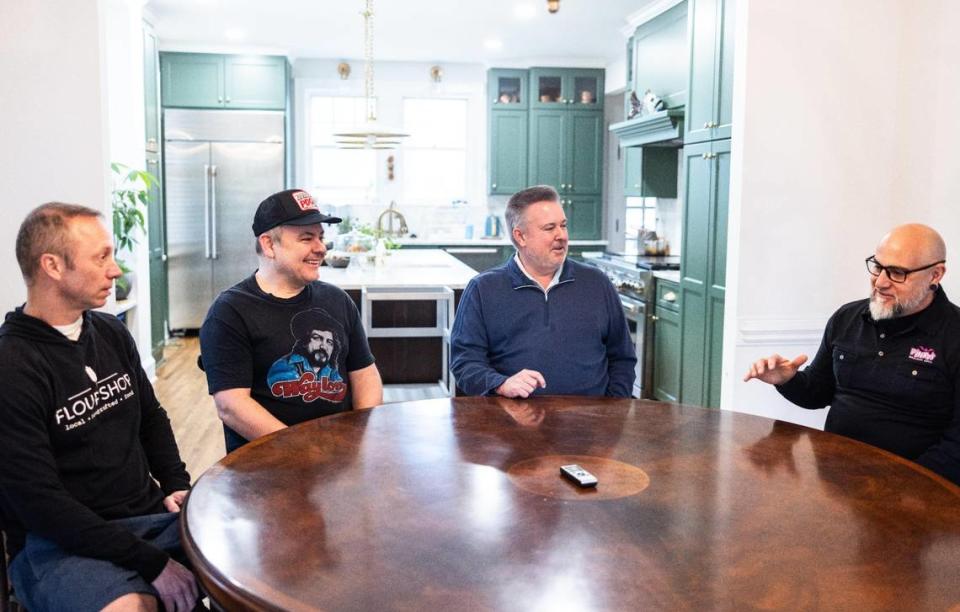
Ramseur: We had the largest textile mill in the world here (the Cannon Mills Company, based in Kannapolis from 1888 to 1983).
They’d make like 300,000 towels a day there. And if you worked there, which a lot of people in this county did, you had a job. But that was about all you had. You got two weeks off for vacation, then you had Fourth of July and Christmas off. That’s it.
Both my grandfathers worked over 50 years in the mill. My grandmother worked 45 years in the mill. You’d go to family reunions and people were wearing polyester suits that are 25 years old because they didn’t have enough money really to buy another. Nobody was getting ahead.
I mean, it used to be that if you were you’re from Cabarrus County — from the mill-working community — you were seen as a ‘linthead.’
Other places would look down on us. If I would meet a girl in Charlotte, as a teenager, I’d be thinking, Well, I’m maybe not good enough for her. That’s always the stigma I had.
Anyway, I think our families probably wanted us to aspire to not work in the cotton mill.
I actually had a teacher in fifth grade, who — one day, on a Friday — she said, “We’re gonna talk about the Industrial Revolution next week.” And on the following Monday, me and some kids had to go out to her car and get all these newspapers. She probably saved newspapers for a year for this. We brought them in the class, and she set us up in all these groups. Some had to fold the newspapers. Some would take scissors and cut them.
For the first day, we did this for about three hours. We didn’t have to do any math or reading, so I thought it was the greatest thing ever. Well, the second day, we all alternated the groups — and it was still pretty great. But by the third day, Wednesday, it was getting a little old. Thursday, none of us wanted to do it. Friday, we about wanted to mutiny. And at the end of the day, she said, “Class, if you don’t study and pay attention and do all the work I ask you to, that’s what it’s gonna be like working in a factory.”
I was an average student, and that was a big, big wake-up call for me. A life lesson: Not to be such a screw-up. I still remember that.
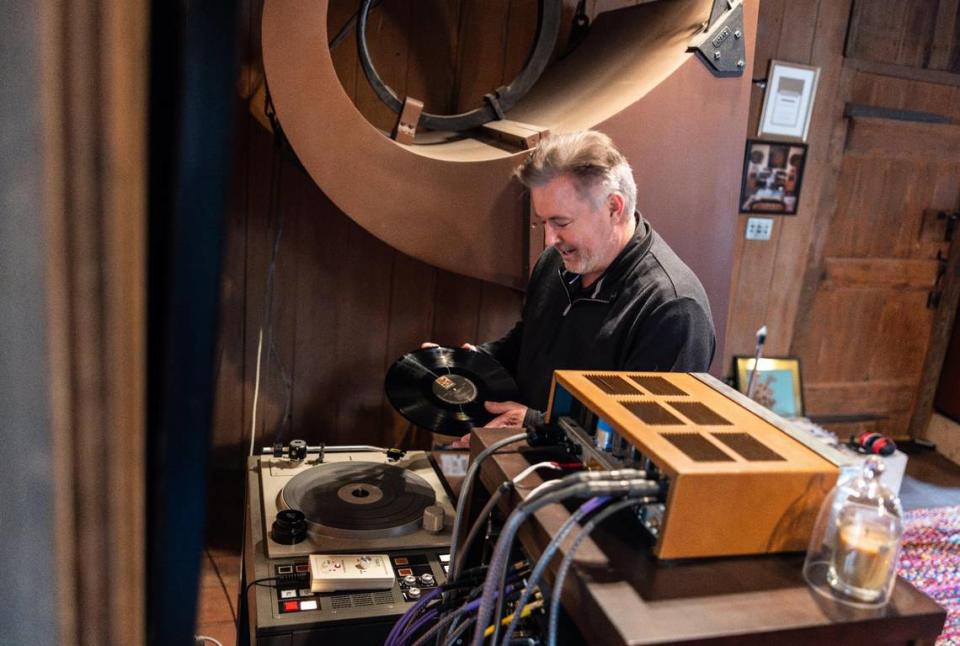
Brian Wilson: But the mill was not necessarily a bad aspect about the county, because you were surrounded by people who were hard-working. And I think the other unique thing about people from this area was that it seemed like they didn’t care if you looked different from them.
My dad was a Methodist minister, so we moved a little bit — we also lived in Lincoln and Union County, and different counties. And in some other counties, it was like, “If we’re working together and you look different from me, I’m not gonna tolerate it.” Here, there was a sense of, “If we’re working together, it doesn’t matter what you look like.” I don’t think there was that same overlying uber-”redneckishness” in Cabarrus County.
I agree, though, that there was a desire to not be in this situation anymore, and then also to not put their kids in this situation. A desperation of “I need to get outta here … someway.” And going in to Charlotte was a way to open your eyes. You would experience different things going to Charlotte.
Ramseur: No doubt. Big eye-opener. Yeah, now they’re almost merged; Concord’s a part of Charlotte in some ways. But at that time, that was totally a different thing. I mean, if you went out in Charlotte, that was a big deal.
Brian Wilson: You went to Charlotte and it was like, “Ohhh, yeah, that’s a possibility.” Whereas sometimes if you’re stuck — if you didn’t go outside the county — then you don’t see that, like, Oh, man, we can do that. It helped show us that the possibilities were endless.
I also think it helped us see the voids in Cabarrus. I can’t think of many iconic places where everybody would meet. Only freakin’ thing I can remember is people cruising the Burger King, you know? So there were voids. And I think in high school we started thinking about ways to fill them.
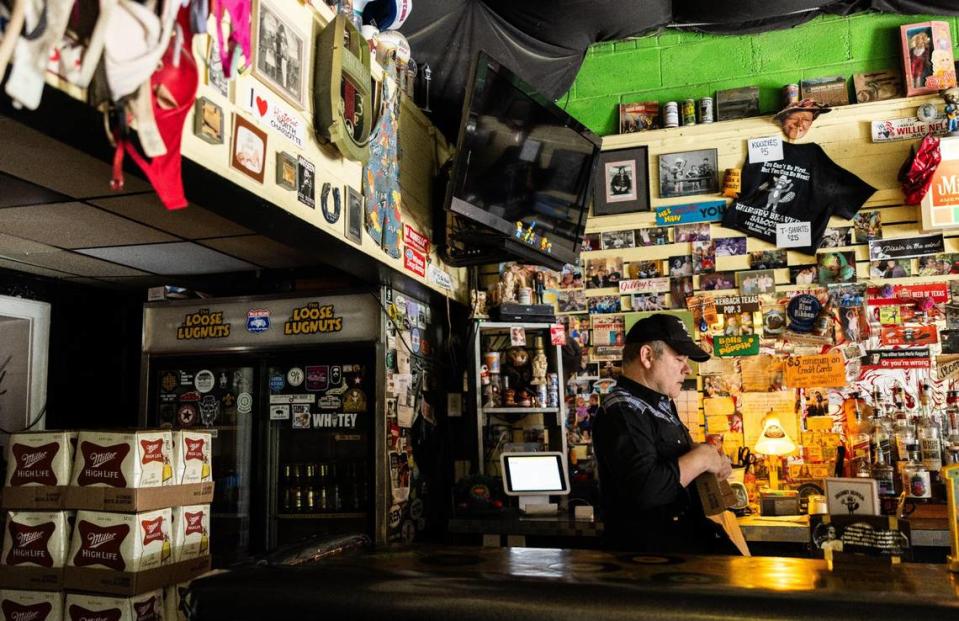
Cauble: Yeah, I played sports up until about I guess freshman year, then my cousin turned me onto skateboarding, and when I came home with Thrasher ramp plans, I showed my dad — I’m like, “Can we build a street ramp?” He came back the next day and wanted to build a half-pipe. So I was the kid with the ramp in his yard. It ended up being a 9-½-foot-tall ramp.
Ramseur: I mean, it had to be one of the best ramps in the state. Had to be. It was the talk. It was a gathering place, for sure.
Brian Wilson: And we had a full-size basketball court behind the parsonage where we lived. We were creating gathering areas, where all these different kinds of people were coming together. So maybe that put something in our head, like, Hey, we want to be a part of these groups that are doing exciting things. Not just standing on the sidelines watching stuff go by and working at a mill.
Cauble: Basically, we wanted to find our place. We wanted to be in the game. But we weren’t on “the city side” of Concord. We weren’t Kannapolis, which was a much larger school. Northwest truly was the underdog.
Ramseur: That’s right. You got a little bit of a chip on the shoulder. You got something to prove.
Here’s an example of that: I remember when I was 16, I bought a record by this classical guitar player named Christopher Parkening — I’ve always loved all forms of music — and I took it over to play it for Andy’s brother, Chris. Chris liked heavy metal, but in some ways heavy metal has got classical elements to it. So I thought he’d like this guy’s guitar playing, and he really did. But we were talking about the cover and the artwork, and Chris said, “We could have done a better job than this.”
That was sort of another wake-up call of I could probably do this. I could put out a record.
It set me on a path ... and about 15 years later, I did. But it was a huge risk. When I decided to get into this music thing, I had two little kids — a 3-year-old and a 1-year-old. I didn’t have a safety net. It was sink or swim.
Trey Wilson: I had almost no money to open Customshop. And I did it anyway. So I think we all took a little leap of faith and just did it, you know?
Cauble: Loved seeing Customshop do so well. It was a unique place in Charlotte. He was one of the first farm-to-table places in Charlotte doing a custom experience. It was like, Man, I went to high school with that dude!
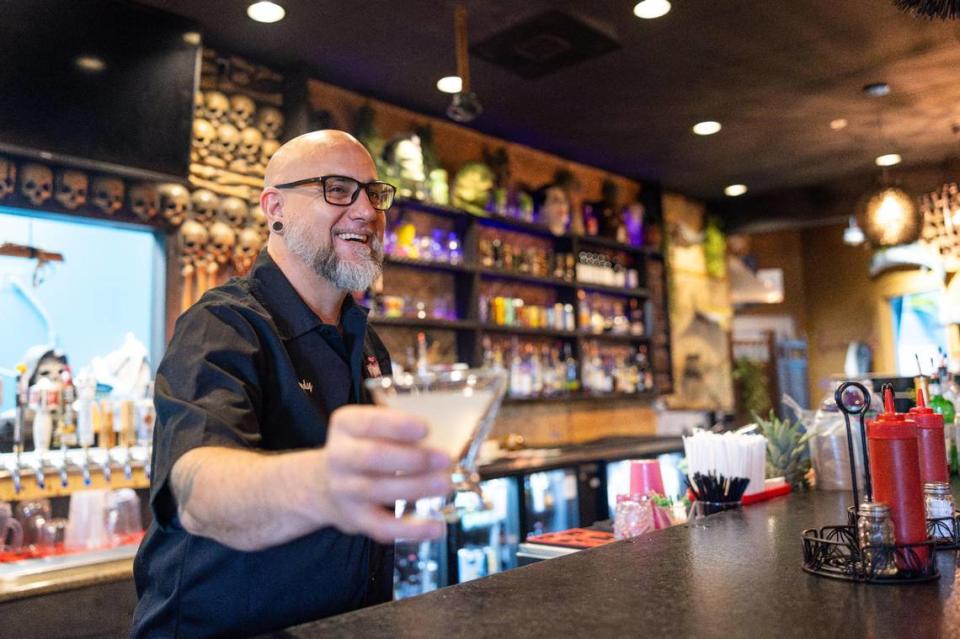
Ramseur: All three of y’all have created these real handmade locations that are unique. There’s nothing else like them in the market.
Brian Wilson: I think what it is is we’ve held on to those those unique things about Concord that shaped us. Kept those things that mean something to us, then put those in our places, in our bands. They’re not Applebee’s. They’re not some big rock band that doesn’t have any uniqueness to it. That’s why they’re memorable. Not because they’re glitzy or flashy.
Ramseur: We haven’t forgotten where we came from, and we haven’t forgotten each other. I’ve always tried to support these guys and I’ve felt supported by them. When Andy started Pinky’s, the Avetts were playing Bojangles and we put together a deal: If you showed a ticket for the concert, he would give you a free order of fried pickles. Brian did a thing where if you went to The Rat’s Nest with a ticket, he’d give you a free Cheerwine. If people were coming in from out of town, I wanted them to go to these places, because I was proud of these guys.
And Trey, I’m realizing I didn’t get you grouped in on that. I’m sorry. I should have.
Trey Wilson: No worries, man.
Ramseur: But I did get Trey into the Avetts’ show at Red Rocks (in Colorado) last year.
Trey Wilson: Yeah, I couldn’t get tickets. I was like, Oh my God, I’m gonna have to call Dolph... I hit him up, he hooked me up, and when I got out there he had me in the front row. Dead-center. I was like, Are you kidding me? Brought me backstage at Red Rocks, gave me the history.
Ramseur: Yeah, so Trey and I have stayed in touch. I haven’t been to Pizza Baby yet, but I’ve gotta take you up on coming over there. I know Scott and Seth Avett, they’ve come over to Flour Shop.
As far as me and Brian, The Avett Brothers did a photo shoot in The Rat’s Nest at one point many years ago. And I always tell bands — if they’re gonna be at Neighborhood Theatre or Evening Muse — to try to step over to The Rat’s Nest. Then another artist that I’ve worked with, David Childers, he plays Thirsty Beaver some.
So all four of us, we’re still in cahoots. And I don’t see it stopping.
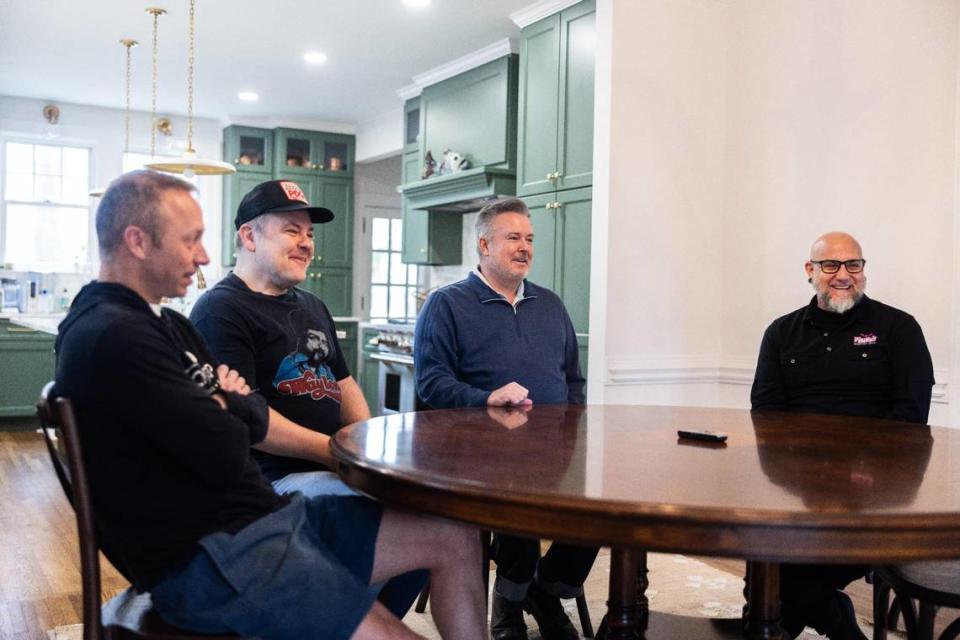
A uniquely ‘cat’astrophic postscript:
After the formal conversation wraps, Ramseur asks Trey Wilson another question about the house, and Trey — who compared to the others has been a man of few words all morning — spins a jaw-dropping story underscoring an unusual price he and his family had to pay for their otherwise enviable Union Street digs:
“When we first moved in, it turned out a wild cat was living in the fireplace coal chute. And it would come out in the middle of the night and terrorize us. You can’t shut the doors in these old homes, so it’d get in our bedrooms and it would just jump on us and attack us. I guess it was territorial. Nuts! Got (my wife) Sandra across the face, got (my son) across the chest. I mean, every night at like 2 in the morning, this cat would come and attack us.
“I’d trying leaving the front door open and I would chase it around with a bat trying to get it out.. But it wouldn’t leave. It would just go down in that coal chute.
“After three nights, we’d gotten almost no sleep — and we’d just opened up Pizza Baby (so we were already stressed and exhausted). On the fourth night, I look in the coal chute with a flashlight and it’s just staring at me. I call the cops, and they come — like, I’m talking all the cops came. (Laughing.) And they put all kinds of traps out. Then the fifth night, 2 in the morning. Clank. I hear it. And in the trap is this little tiny cat. It was just feral.
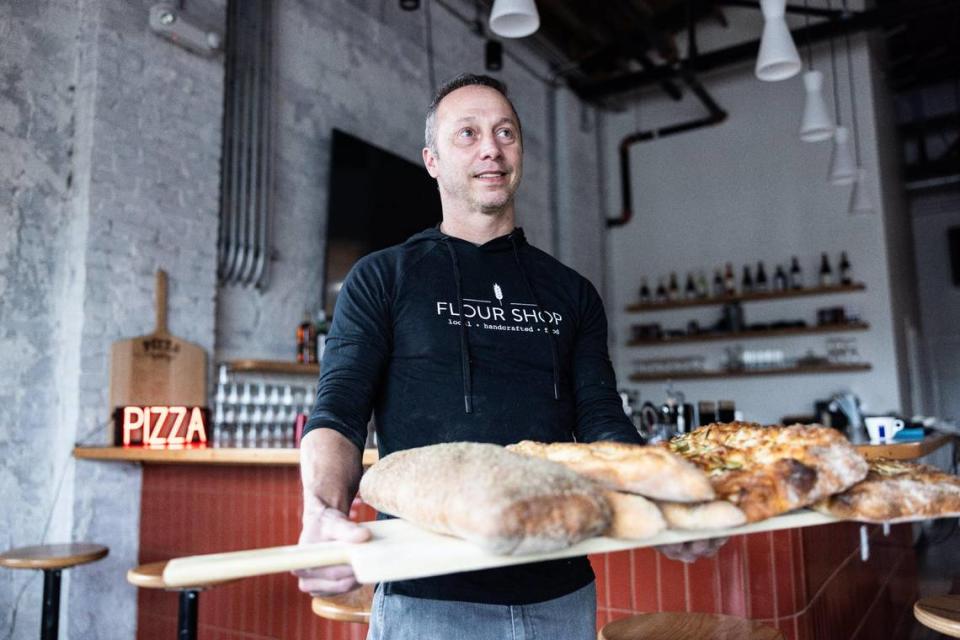
“And I was like, ‘Well, maybe we can (get it healthy and re-home it) —’ but oh my God, I went near the cage and this thing turned into like a mountain lion. They’re like, ‘Yeahhhh, we’re gonna have to put that thing down.’ This cat was beyond gone.”
All three other guys’ eyes are fixed wide-open. Someone mentions that this quite possibly is more interesting than their success stories. They all laugh.
“Let’s go,” Brian Wilson quips, as the meeting breaks up, “with the cat story.”

